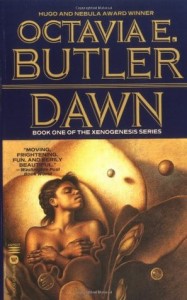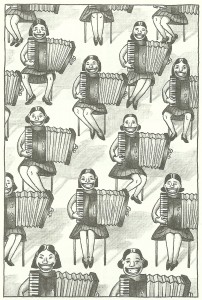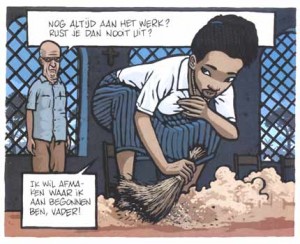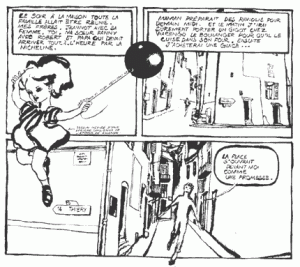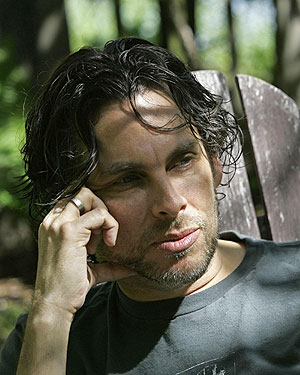This is part of a roundtable on the work of Octavia Butler. The index to the roundtable is here.
__________
How do critiques of identification complicate Western models of empathy? What might empathy look like, and produce, when it doesn’t require identification? What about more difficult cases in which the reader is required to empathize with the oppressor, or with more complicated protagonists? – Megan Boler, “The Risks of Empathy”
She was not afraid. She had gotten over being frightened by “ugly” faces long before her capture. The unknown frightened her. The cage she was in frightened her. She preferred becoming accustomed to any number of ugly faces to remaining in her cage. – Octavia Butler, Dawn
I didn’t agree to participate in this roundtable on Octavia Butler because I enjoy her writing, but rather because I don’t. My admiration for her storytelling is nothing short of begrudging; I have to work at it. And I’ve always been careful to attribute my resistance to matters of personal taste. Butler is, after all, a beloved award-winning writer in science fiction, a pioneer who helped open a space for communities of black speculative fiction writers that I adore, including Nnedi Okorafor, N.K. Jemison, Tannarive Due, and Zetta Elliot. So if I find the slug-like aliens in Dawn nauseating or if the pedophilic undertones in Fledgling nearly keep me from finishing the novel, then I assume that’s my problem.
My displeasure doesn’t prevent me from recognizing Butler’s importance in my African American literature courses and I teach her fiction whenever I can, with her 1979 novel Kindred being the most popular. Students are eager to embrace the story’s invitation to see the interconnected perils of slave resistance and survival through Dana’s modern eyes, grateful that the narrative’s historical corrective comes at the comfortable distance of science fiction tropes. The book raises provocative questions for debate, although I admit to being troubled by how often readers come away from Kindred convinced that they now know what it was like to be enslaved. Too often, their experience with the text is cushioned by what Megan Boler characterizes as “passive empathy”: “an untroubled identification that [does] not create estrangement or unfamiliarity. Rather, passive empathy [allows] them familiarity, ‘insight’ and ‘clear imagination’ of historical occurrences – and finally, a cathartic, innocent, and I would argue voyeuristic sense of closure (266).
Much of Butler’s fiction doesn’t work this way, however. Estrangement and unfamiliarity, particularly in relation to ugliness and the repulsiveness of the alien body, are central to her work. And this is what gets me. The non-human creatures she imagines make me cringe and their relationships with humans in her fiction are even harder to stomach. My first reaction to the Tlic race in Butler’s 1984 short story, “Bloodchild,” was disgust, made all the more unnerving because of the great care Butler seemed to take in the description of the strange species; the serpentine movements of their long, segmented bodies resemble giant worms with rows of limbs and insect-like stingers.
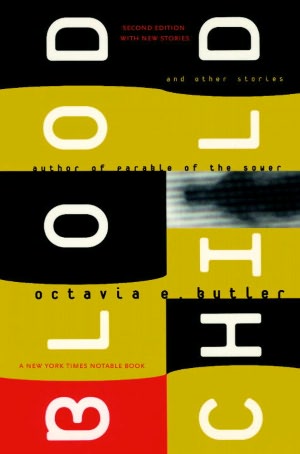
It doesn’t matter to me that the Tlic can speak English and feel pleasure and build governing institutions, not when they look like that. In the story, they use humans of both sexes to procreate in what initially appears to be a mutually beneficial, parasitic relationship, at least until the main character, a young human male named Gan, begins to question the status quo. Butler’s description of Gan curled up alongside T’Gatoi, the Tlic who has adopted him and his family, is not really an image I want to grapple with for long:
T’Gatoi and my mother had been friends all my mother’s life, and T’Gatoi was not interested in being honored in the house she considered her second home. She simply came in, climbed onto one of her special couches, and called me over to keep her warm. It was impossible to be formal with her while lying against her and hearing her complain as usual that I was too skinny.
“You’re better,” she said this time, probing me with six or seven of her limbs. “You’re gaining weight finally. Thinness is dangerous.” The probing changed subtly, became a series of caresses. (4)
T’Gatoi uses her authority as a government official to protect humans (called Terrans) in exchange for the use of their bodies as reproductive hosts. The balance of power between the two species tips back and forth in the interest of self-preservation and free will. Gan isn’t sure he wants to be impregnated – is he a partner or a pet? – but he ultimately submits under the terms of a negotiated relationship that takes into account both his discomfort with the T’Gatoi’s rules and his reluctant longing for her affection. T’Gatoi, too, has desires and cares for Gan. She also wants her Tlic children nurtured in a loving home if they are to survive. And while I admit that I can relate to these feelings and conflicted needs, this is a kind of intimacy that I’m willing to share with a pregnant man, not with a bug.*
Boler asserts that Western models of empathy are based on acts of “consuming” or universalizing differences so that the Other can be judged worthy of our compassion. Despite our best efforts, we end up using the Other “as a catalyst or a substitute” for ourselves in order to ease our own fears and vulnerabilities, rather than actively working to change the assumptions that shape our perspective (268). I’m in awe, then, of the way Butler’s science fiction heightens readers’ physical discomfort with characters like the Tlic in order to rebuff passive empathy and other modes of identification that absolve us of the need for critical self-reflection. T’Gatoi is the Other that I can never fully know. I can’t easily reduce her experience to my own, but I also can’t deny the prickle of recognition that comes from the emotional struggle between the Tlic and the Terrans. When Gan’s mother jokes, “I should have stepped on you when you were small enough,” I recognize her bitterness as a survival strategy, an attempt to upset a social hierarchy and dissociate from the Not Me.
So when I recoil at every reminder of T’Gatoi’s “ugliness,” I wonder what this emotion says about my approach to difference in society and in myself. How does my reaction to the unfamiliar outside the story, my unwillingness to engage the socially embodied strangeness of 2014, compare to the blustery panic of creepy crawly things I want to step on because they are small enough? (And what about those times when the bug is me?)
“Bloodchild” turns my personal readerly aversion into an ideological dilemma and advances the more challenging work of what Boler describes as “testimonial reading”:
Recognizing my position as ‘judge’ granted through the reading privilege, I must learn to question the genealogy of any particular emotional response: my scorn, my evaluation of others’ behaviour as good or bad, my irritation – each provides a site for interrogation of how the text challenges my investments in familiar cultural values. As I examine the history of a particular emotion, I can identify the taken-for-granted social values and structures of my own historical moment which mirror those encountered by the protagonist. Testimonial reading pushes us to recognize that a novel or biography reflects not merely a distant other, but analogous social relations in our own environment, in which our economic and social positions are implicated. (266-7)
Boler’s work on emotion and reading practices draws on her experience teaching Art Spiegelman’s Maus and other fictional works about historical events to make her case. But Butler’s science fiction thought-experiments also provide a framework for a mode of bearing witness that is just as complicated .
In the 1987 novel, Dawn, the first book of Butler’s Xenogenesis Trilogy (retitled Lilith’s Brood), the main character models the task of testimonial reading against the “affective obstacles” that hinder awareness of “the power relations guiding her response and judgments” (265). These obstacles initially come in the form of extraterrestrials called the Oankali whose bodies are entirely covered with writhing, grayish-white sensory tentacles. They have rescued groups of human survivors, including a black woman named Lilith, in the wake of nuclear destruction on Earth. Awakened on their ship years later, Lilith is required to remaining in her room with one of the ugly creatures until she can look at them without panic. The aliens know that before Lilith can interact with their society without harming herself or others, she must grapple with her revulsion at their physical appearance:
[The Oankali] walked across the room to the table platform, put one many-fingered hand on it, and boosted himself up. Legs drawn against his body, he walked easily on his hands to the center of the platform. The whole series of movements was so fluid and natural, yet so alien that it fascinated her.
Abruptly she realized he was several feet closer to her. She leaped away. Then, feeling utterly foolish, she tried to come back. …
“I don’t understand why I’m so… afraid of you,” she whispered. “Of the way you look, I mean. You’re not that different. There are – or were – life forms on Earth that looked a little like you.”
He said nothing.
She looked at him sharply, fearing he had fallen into one of his long silences. “Is it something you’re doing?” she demanded, “something I don’t know about?”
“I’m here to teach you to be comfortable with us,” he said. “You’re doing very well.”
She did not feel she was doing well at all. “What have others done?”
“Several have tried to kill me.”
She swallowed. It amazed her that they had been able to bring themselves to touch him. “What did you do to them?
“For trying to kill me?”
“No, before – to incite them.”
“No more than I’m doing to you now.” (16-17)
Entire chapters are spent detailing the process through which Lilith learns to view the Oankali named Jdahya without fear. Their exchange invites comparisons with the xenophobia and prejudice of our own world, of course; Lilith’s dark skin could easily elicit similar reactions. Untangling the “genealogy” of her emotional responses becomes even more daunting once she learns that the aliens have three sexes and the ability to manipulate the genetic material of other beings. She is repulsed one moment, curious the next. Unable to look away, she demands answers from Jdahya until her body’s refusal to accept what he is becomes physically and emotionally exhausting. It is then that she begins to ask questions of herself. “God, I’m so tired of this… Why can’t I stop it?” (26).
Butler turns Lilith’s reactionary apprehension into a more productive space for her and for us as readers so that we may all think more critically about the larger forces at work in our judgments of others. To me this is what makes Butler an exceptional storyteller, whether I like her writing or not. Equally important is the fact that Lilith’s encounter with this single Oankali is only a first step. She’ll have to leave the room, meet others, apply what she has learned. For my own part, I’m now half way through Adulthood Rites, the second book in Lilith’s Brood and it is slow going, but I want to finish. The story has been difficult and deeply rewarding for me in a way that I’ve come to expect from Octavia Butler, a reading experience not unlike the probing of limbs that turns to a series of caresses.
*Nnedi Okorafor also explores dynamics of power through human companionship with an insect-like robot in her terrific short story, “Spider the Artist.”
Works Cited
Boler, Megan. “The Risks of Empathy: Interrogating Multiculturalism’s Gaze.” Cultural Studies. 11 (2) 1997: 253-73.
Butler, Octavia. Bloodchild and Other Stories. New York: Seven Stories Press, 1996.
—–. Lilith’s Brood: Dawn, Adulthood Rites, and Imago. New York: Warner Books, 2000.

